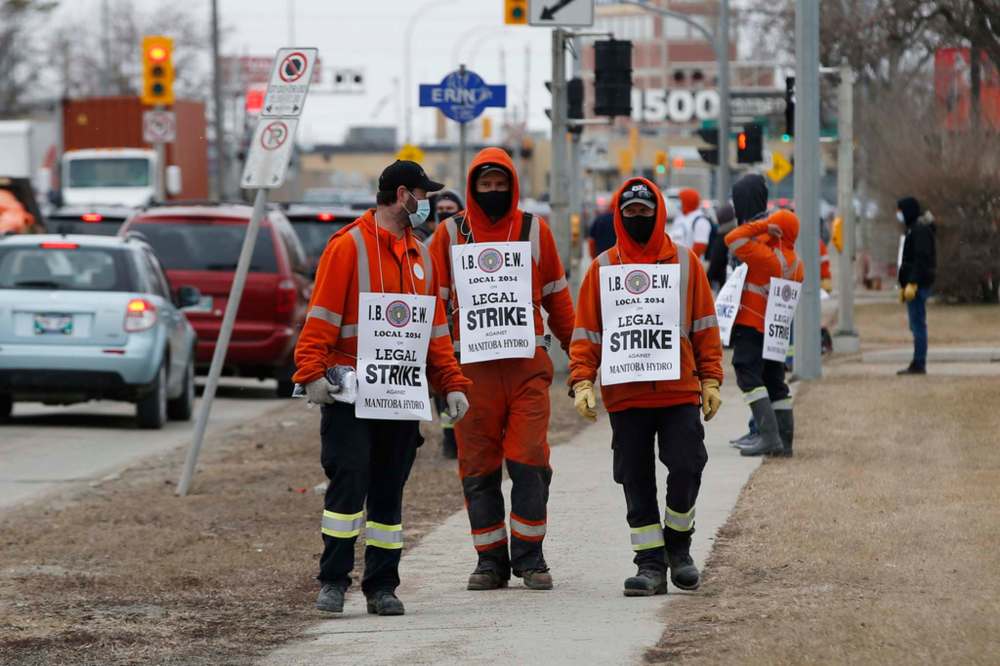Strike action generating millions in Hydro costs: union
Advertisement
Read this article for free:
or
Already have an account? Log in here »
To continue reading, please subscribe:
Monthly Digital Subscription
$1 per week for 24 weeks*
- Enjoy unlimited reading on winnipegfreepress.com
- Read the E-Edition, our digital replica newspaper
- Access News Break, our award-winning app
- Play interactive puzzles
*Billed as $4.00 plus GST every four weeks. After 24 weeks, price increases to the regular rate of $19.95 plus GST every four weeks. Offer available to new and qualified returning subscribers only. Cancel any time.
Monthly Digital Subscription
$4.99/week*
- Enjoy unlimited reading on winnipegfreepress.com
- Read the E-Edition, our digital replica newspaper
- Access News Break, our award-winning app
- Play interactive puzzles
*Billed as $19.95 plus GST every four weeks. Cancel any time.
To continue reading, please subscribe:
Add Free Press access to your Brandon Sun subscription for only an additional
$1 for the first 4 weeks*
*Your next subscription payment will increase by $1.00 and you will be charged $16.99 plus GST for four weeks. After four weeks, your payment will increase to $23.99 plus GST every four weeks.
Read unlimited articles for free today:
or
Already have an account? Log in here »
Hey there, time traveller!
This article was published 06/04/2021 (1787 days ago), so information in it may no longer be current.
The union representing striking Manitoba Hydro electrical workers claims four weeks of rotating work stoppages have already cost the Crown corporation tens of millions of dollars.
Mike Espenell, business manager for the International Brotherhood of Electrical Workers Local 2034, said Hydro continues to be hamstrung at the bargaining table by the dictates of a tight-fisted provincial government.
“I think it’s been made abundantly clear that there is a significant amount of (political) interference,” he said Monday, referring to the Progressive Conservative government.

The IBEW said its four-day general strike in 2009 reportedly cost Hydro around $6 million. The union said the figure was cited by a Hydro executive, in an appearance before the Manitoba Public Utilities Board in 2012.
The union claims the current strike is adversely affecting power sales, particularly export sales, and delaying key maintenance work. The rotating strikes also mean power outages are taking longer to restore, it says.
Hydro denied the labour disruption has had any effect on exports.
“There has been no loss of revenue either domestically or in export markets as a result of the strike,” the corporation said in a statement to the Free Press.
However, it did not deny there have been costs.
“There’s no doubt the strike is having and will continue to have a financial impact on Manitoba Hydro and its customers,” the statement said. “There are several factors that go into calculating these costs, and it’s likely we won’t have an exact cost for some time.
“Our primary objective right now is to ensure we protect public and employee safety and maintain reliable service during the strike, although response times may be longer than usual.”
Citing an internal work order cost report, the union claimed the Crown corporation is having to pay high overtime rates to supervisors and an untold amount to out-of-province contract workers to fill in or remain on standby in case a particular location is targeted in the ongoing rotating strikes.
The IBEW local represents 2,300 Hydro workers, who have been without a contract since Jan. 1, 2019.
Hydro has offered the union zero per cent increases for 2019 and 2020, a 0.75 per cent wage boost for the current year, and a one per cent increase for 2022 — in line with government guidelines for the bargaining of new public-sector contracts.
The PC government so far has shown no signs of wavering from its demand public-sector workers accept wage freezes. A bill legislating the wage guideline was passed by the Manitoba legislature but never proclaimed. It was struck down in Court of Queen’s Bench, but the government has appealed the decision.
The union said it has offered to pare down its list of outstanding demands to 10 items and go to arbitration once the strike hits the 30-day mark later this week — a move, it says, that could potentially save the corporation millions of dollars.
Under Manitoba law, the union cannot be guaranteed an arbitrated settlement until it is out on strike for 60 days.
Hydro director of corporate communications Scott Powell said the company is not in a position to accept binding arbitration.
“We remain committed to finding a solution through the collective bargaining process,” he said.
Hydro said it believes the offer made to workers is fair.
A spokeswoman for Crown Services Minister Jeff Wharton said it’s the government’s historic role to set “broad and consistent” collective bargaining mandates for the public sector.
“These now reflect the unprecedented COVID-19 challenges all Manitobans are facing, as government continues to make massive expenditures for public health and protection and support for hurting Manitoba workers and businesses, while keeping taxes and rates as low as possible for all Manitobans,” she said.
larry.kusch@freepress.mb.ca

